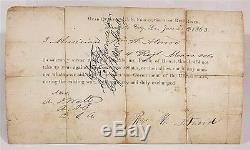1863 CONFEDERATE STATES CIVIL WAR POW PAROLE OATH SIGNED By UNION SOLDIER 4th MA


Very rare, original, 1863 Part Printed, Official Confederate States of America Prisoner of War Parole Oath Document signed by Union Musician William W. Atwood - a member of the 4th Regiment, Massachusetts Volunteer Infantry at Brashear City, Louisiana. This important and seldom encountered Document measures approx.
6 7/8" 5"" and is a Document signed by Musician Atwood at the time of his parole promising not to "take up arms against the Confederate States of America. Over the past 36+ years we have owned a few similar "Oaths" signed by Confederate Soldiers at the end of the War but this is the first such parole Document we have ever encountered that was signed by a Union Soldier POW upon his parole from Confederate custody.
Document is dated June 25th, 1863 at Head Quarters C. Forces, South of Red River / Brasher City, La.
It reads as follows (manuscript entries are in italics). Atwood do solemnly swear and pledge this my Parole of Honor, that I will not take up arms against the Confederate States, or their allies, nor in any manner whatsoever aid, assist or abet the Government of the United States during the existing war until regularly and duly exchanged. The Document is countersigned by Captain Samuel E. Thomason of the 176th Regiment New York Infantry who was wounded at Bamshear City and captured along with Musician Atwood. This very rare and fascinating , 1863 Confederate States of America Prisoner of War Parole Oath Document is in good to very good condition. The Document is complete and intact but is mounted to a very old partial sheet of lined paper. There are strong folds as carried by the paroled soldier and some separation at the folds as well as discoloration at the creased. There is other foxing as can be seen in the scans below. A very rare and original, 1865 Part Printed, Official Confederate States of America Prisoner of War Parole Oath Document and a fantastic addition to any collection!! ABOUT THE CIVIL WAR POW PAROLE SYSTEM. Lacking a means for dealing with large numbers of captured troops early in the war, the U. The terms called for prisoners to give their word not to take up arms against their captors until they were formally exchanged for an enemy captive of equal rank. Parole was supposed to take place within 10 days of capture. Generally it was granted within a few days, especially after a major battle where thousands of troops were involved. The system grew increasingly complex, cumbersome, and expensive as the war progressed and the number of parolees soared.The prospect of being sent home encouraged many men to allow themselves to be captured in battle or by straggling. Some parolees were permanently lost to she army when they failed to return to their units. Detention camps established by Federal authorities angered parolees, as did attempts to use them as guards, send them west to fight Indians, or give them noncombat assignments.
Technically, paroled troops could not be given any duty that would free other soldiers for combat, an interpretation upheld by military courts. While paroling was in force, many inequities surfaced in the system. Soldiers assigned to detention camps frequently suffered from shortages of food and clothing and poor sanitation and were victimized by a criminal element among them. The men often became pawns for the governments, officers at one point being denied parole until formally exchanged. The alternative, confining captured enemy troops to prison camps, became policy for the 2 belligerents.The item "1863 CONFEDERATE STATES CIVIL WAR POW PAROLE OATH SIGNED By UNION SOLDIER 4th MA" is in sale since Friday, September 09, 2016. This item is in the category "Collectibles\Militaria\Civil War (1861-65)\Original Period Items\Documents". The seller is "walnutts" and is located in Brewster, Massachusetts. This item can be shipped worldwide.

